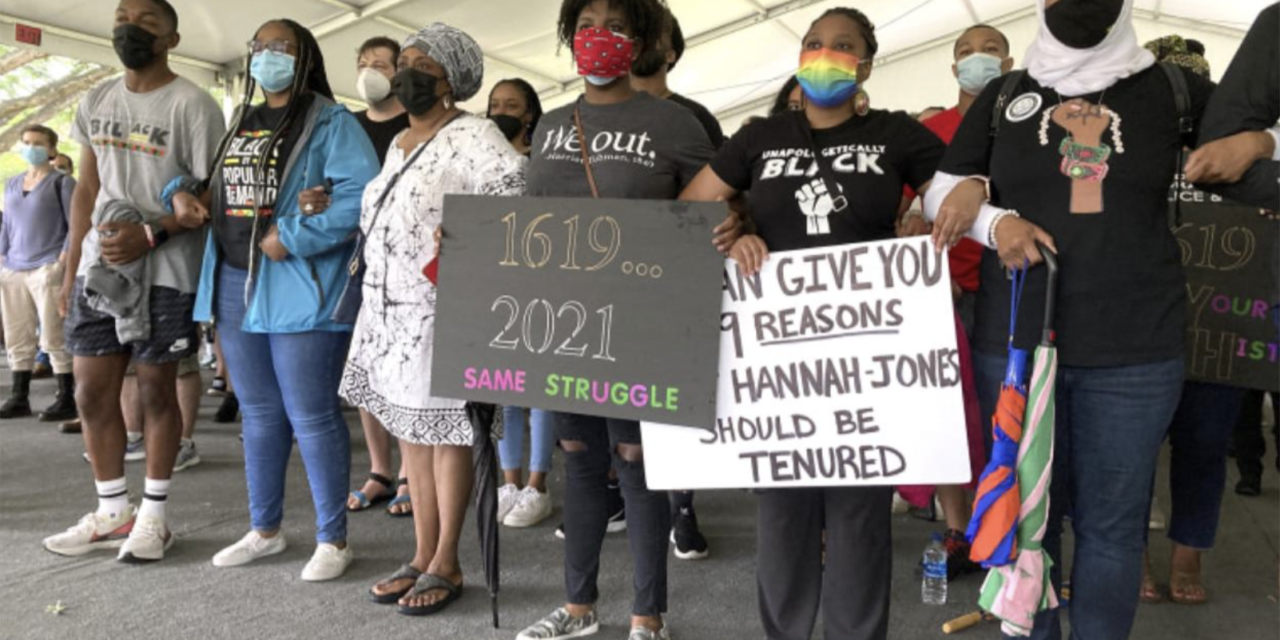I don’t know Nikole Hannah-Jones personally, but I am certainly a big fan of her work and can empathize with her challenges as a Black woman who is simply trying to excel in her field and make a contribution to society. I was overjoyed at the news that she turned down the University of North Carolina Chapel Hill’s offer of a tenured position, after their initial denial. She will join the faculty at Howard University instead as the Knight Chair in Race and Reporting. While the story seems to end well, I am also thinking about the emotional toll that she has endured since her seminal work on The 1619 Project.
The New York Times 1619 Project is Hannah-Jones’ Pulitzer Prize-winning journalistic endeavor, first published in August 2019 to commemorate the 400 year anniversary of the arrival of the first enslaved Africans. The purpose of the long-form journalism endeavor is to “reframe American history by considering what it would mean to regard 1619 as our nation’s birth year. Doing so requires us to place the consequences of slavery and the contributions of Black Americans at the very center of the story we tell ourselves about who we are as a country.” The project also includes a broadsheet article, live events and a podcast. As a part of our client learning experiences, we often include The 1619 Project podcast series as pre-work to provide a more accurate depiction of African American history than most of us learned in school. Hannah-Jones gained wide and well-deserved acclaim for the initiative.
While Hannah-Jones, a 2017 McArthur Genius Grant winner, was lauded for her work by many, there has also been significant controversy about The 1619 Project, with the accuracy of her accounts being challenged by “prominent historians” who alleged that the project put ideology over historical understanding. Donald Trump, not surprisingly, joined the critics, declaring The 1619 Project unpatriotic and vowing and that he would initiate a 1776 Commission as a response.
Recently, Hannah-Jones has been in the firestorm again, this time over the initial decision of University of North Carolina Chapel Hills’ Board of Trustees to deny her tenure, even after strong endorsements from faculty, staff and alumni. She was instead offered a five year teaching contract without tenure. Apparently, the decision to deny her tenure was due to pressure from large donors to the school and some board members who objected to her work. Even though the Board recently voted to reverse their initial decision, four of the 13 trustees still voted to deny her tenure. I serve on a university board and know that tenure decisions are usually board “rubber-stamped” because we trust that those charged with reviewing tenure applications have done their due diligence. Hannah-Jones was to serve as the Knight Chair in Race and Investigative Journalism. All others who previously held this seat were granted tenure without delay.
What can we learn from Hannah-Jones’ situation?
The Myth of the Meritocracy: Obviously, Nikole Hannah-Jones carried all of the credentials needed for a tenured position and then some. Merit had nothing to do with the decision to deny her tenure. It was clearly about her attempt to provide a more accurate account of our country’s sordid racial history and the commitment of those in power to continuously bury it. Hannah-Jones said in her statement declining the UNC Chapel Hill position: “I have never asked for special treatment. I did not seek it here. All I asked was to be judged by my credentials and treated fairly and equally.”
Nikole Hannah-Jones has the credentials needed for a tenured position - and then some. Merit had nothing to do with the denial of tenure. It was about her attempt to provide an accurate account of our country’s racial history. Click To TweetIt’s Always Politics: We are delusional if we don’t understand that everything is ultimately about politics – with both lowercase and uppercase P. Five states have tried to pass legislation to ban the teaching The 1619 Project. As a state-funded school, the UNC Chapel Hill has been penalized financially in the past with the cutting of funding because conservative lawmakers allege the school is too liberal. Partisan politics is at the heart of discussions about justice and equity. Consider the fight between those in Congress who would deny that systemic racism exists and vote down any bill designed to dismantle it, and those who continue to fight for justice.
The Power of Protest: While the Board of Trustees wields a lot of power, so do the people. The outcry from the UNC community, as well as the nation, over this blatant injustice was swift and effective. It was also an opportunity for UNC faculty, staff and students to spotlight years of racial injustice at the school through organized protests.
“You’ve Got the Power:” Nikole Hannah-Jones wielded her own power by turning down the offer from UNC. It was indeed a “powerful” demonstration of her ability to reject oppressive systems in favor of a place where she will be valued and respected. We talk a lot about “empowering” people. Turn that “em” into “me-power.” She said: “At some point, when you have proven yourself and fought your way into institutions that were not built for you, when you’ve proven you can compete and excel at the highest level, you have to decide that you are done forcing yourself in.”
Nikole Hannah-Jones wielded her own power by turning down the offer from UNC. It was indeed a 'powerful' demonstration of her ability to reject oppressive systems in favor of a place where she will be valued and respected. Click To TweetThe Emotional Cost: Even though Hannah-Jones had the last laugh so to speak, it did not come without a great deal of consternation, or as I write about, Black Fatigue. This is the most disturbing aspect of this situation. In her full statement about declining UNC’s offer, she shares the strain on her personally. She talks about how overjoyed she was when she was accepted into the Masters journalism school in 2001 and how excited she was to return to her alma mater to teach as the Knight Chair. “Being asked to return to teach at Carolina had felt like a homecoming; it felt like another way to give back to the institution that had given so much to me.” She describes the anguish of learning that she had been denied tenure and the emotional roller coaster that ensued. She had accepted the five-year contract without tenure and without publicly speaking to the injustice. It was one of the conservative board members who published his dissent over her hiring as a non-tenured faculty member. This put Hannah-Jones back in the limelight with all of the media coverage, which no doubt took another toll.
UNC Chapel Hill’s Loss: Not only did they lose a superstar this time, but what future Black talent will they lose? This is a public relations nightmare for the University. They have been once again called out for racist actions. The first thing they should do is examine who is on the Board, how Board members are selected and to what extent to they embody the principles of equity and justice.
I can only imagine how fatiguing it was for Hannah-Jones to go through this process, and finally make the decision to accept the appointment at Howard. She speaks to the lack of transparency among University leadership in sharing the reasons for denying her tenure and the untruths that were told. Why should someone who is so accomplished and has made such a significant contribution to understanding Black history from the perspective of Black people be humiliated and degraded in this way? The answer is that racism continues to loom large in our society, and it is exhausting. It impacts our physical, mental and spiritual health. I pray for healing for my sister Nikole Hannah-Jones and that she will continue to thrive and teach us all more of the truth.
Racism looms large, and it is exhausting. It impacts our physical, mental and spiritual health. I pray for healing for my sister Nikole Hannah-Jones and that she will continue to thrive and teach us all more of the truth. Click To Tweet



















